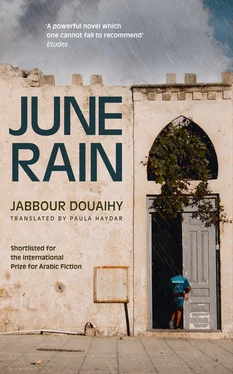The visitors who frequented the house did not speak Arabic. It must have been the case, therefore, that one of the young men of the house worked as a translator at the French Consulate in Beirut where he made a wide circle of acquaintances. Or maybe the oldest son had started but not completed his studies in Ayntoura under Father Sarloutte of the Lazarean Order, who in his turn recommended him to the French High Commissioner for one of the deputy positions allotted to the mandate power in the newly established Parliament. Or possibly as Education Minister in a cabinet that didn’t last more than two months. And maybe his father had been appointed as head of a county at a time when Wasa Pasha, the Governor of Mount Lebanon, had a weakness for gifts and invitations to banquets graced with beautiful, flirtatious ladies.
The great families didn’t like to be too numerous. They would give derisive nicknames to cousins who held the family name and tried to make the nicknames stick, singling themselves out as the only pure and unadulterated holders of that name, as a way of proving their true nobility and God-given right to its sole ownership. If any relatives stood beside them to accept condolences for the loss of a member of the family, the esteemed member of the family would yell at them disapprovingly and tell these cousins — ones the general public didn’t recognise as family members — to back off and stay clear of the right side of the church door, which was only for ‘me, my brother, and my nephew’. He would say this in an accent so foreign to them they wondered where the elder had got it from, or thought perhaps he was putting on the accent to distinguish himself from them. It seemed their preference for small numbers and their desire to limit ownership and influence to only a few heirs made them hold back from having many children as well. And so these great houses were always under threat of extinction, as they say.
The symbol and luminary leader of the great house was forever memorialised in a sculpture of him riding a shiny bronze horse, by the famous sculptor Yusef Hwayyek. The day it was unveiled a select group of Lebanese poets and poet singers who hailed from the furthest reaches of the country were in attendance, and at the base of the statue an anonymous line of poetry was inscribed: You filled their hearts with so much fear… They thought the earth had sprouted men. The patriarch also appears in a huge oil painting that carries the signature of Daoud Qurm, the famous artist who did not leave a single church without adorning its saints in the most magnificent vestments inspired by the Italian Renaissance. In the painting, which hangs above the altar in Saint George’s Church, the patriarch brandishes his sword high, his eyes peeled to the horizon, in front of the church courtyard. Saint George also appears, riding on horseback with his spear held high.
The statue is not of a man dead and buried, for the corpse of the patriarch is still there inside the church, preserved without embalmment in a glass box. Yes, they all insist it was not embalmed. For more than a hundred years the line of visitors passing before his corpse has not stopped, and it was as though he never died. His name was at the top of the list in the census taken just after the Great War, even though he had died at least thirty years before that, and so he was the first of the living and the oldest of the dead. They appealed to him, asking for help and intercession every time they lost something dear to them, such as when a child lost the only coin in his pocket.
They distributed calendars with a picture of him in his name. Sometimes the picture showed him standing in audience with the Pope in Rome when the European Consuls, in collusion with the Maronite Patriarch who was afraid of him, as people asserted, consented to his exile. Another picture showed him wearing a vest embroidered with gold thread. They named the local football team after him as well as a number of organisations founded by emigrants to Mexico and Argentina. They constructed reliefs of his magnificent statue out of wood, steel and adobe and the artists depicted him in battle in the second half of the nineteenth century, corpses piling up around him. Amateurs started their drawings of him with his radiant face and his manly features. He was the subject of all their poems and they elegised him asking heaven to let the April moon shine down on him and on his men and guide them at night through their battles and help them to subdue their enemies. They called him ‘The Hero of Lebanon’, and he was virtuous, unsullied and prudish to the point that he forbade women to roll their sleeves up past their elbows.
After his death his nephews were given preferential treatment. There were three of them and the Turkish Administrative Authorities placated them with administrative positions. And just as the descendents of those great families feared, the first one didn’t have any children, which they assumed was due to his wife’s barrenness, and he died young. The second had a son who died in the prime of his youth from a disease they called ‘ reeh al-sudaad ’, the ‘cork wind’. His illness lasted for several days, and the people offered up sacrificial prayers for his recovery, imposing a fast on their livestock and bloodying their knees by crawling on them all the way to that little church on one of the hilltops where they prayed to the Virgin to intercede for him. His mother refused to allow him to be buried before her. She kept him at home with her in a tightly sealed coffin until, twenty years later, they carried her out of the house to be buried before him, as she had insisted.
The third nephew fathered a son from a second marriage just before he died, but they didn’t wait for the boy to grow up and instead chose a distant relative as their leader. Despite being a commoner and a cobbler by trade, he was possessed of great courage. Things began to change and there were people who competed for his position. Nevertheless, there always remained a number of small families who admired the descendents of the great families and beat the drums in celebration of their weddings or births, drums that had to be of a certain number and size depending on the occasion. They let out ululations when the heir of the great house passed one of the government exams and they congregated around the house if he got sick or had a fever. They hoisted black flags when one of them died, even if he was an aged invalid, and eulogised him as if death had struck him riding high up on his horse, exactly the way his great uncle sat there on his bronze saddle. They eulogised him saying:
O auburn mare, you with the beauty spots
Say not that your lord has passed away
Your lord has gone to Beirut
To bring you a pair of stirrups
With the change of regimes almost everyone around the great families parted company, especially since those who remained, who were blood relatives as they said — some for certain and some imaginary — woke up to themselves. They remembered that they were descended from the same grandfather, and the first thing they woke up to was their names. They realised all of a sudden that there were many of them and unfortunately they were divided up in support of this or that influential great family member. Suddenly they discovered that they could get one of them into parliament after the French mandate enacted an election law in two stages at first, and then by general election in an effort to introduce democracy in small doses to the countries of the East.
They were fever-stricken, even though a few years earlier the General Administration of Internal Affairs had asked them to come to the old government house, which they had built with unparalleled help out of their desire to turn their town into a centre for the Governorate, and not to forget anyone in their charge. They had answered the call in droves after they heard numerous rumours threatening that if they didn’t register their names they would no longer be Lebanese. They had declared their names the way they had inherited them, handed down from grandfathers to fathers and as the priest had written them in the church record books when they were christened or when they were married or when their hour came. One example was: ‘On the night of Thursday, the 14th of July, 1930, at 2:30, Butros Antonios Khattar passed away suddenly in his sleep, and received absolution by the hands of the priest Elias al-Mardini.’ But they now started insisting on writing their full names, Butros Antonios Khattar al-Rami, as if leaving out the family name had suddenly become an unforgivable sin against them and an infringement of their honour and an attempt to suppress a noble lineage they had just discovered.
Читать дальше












